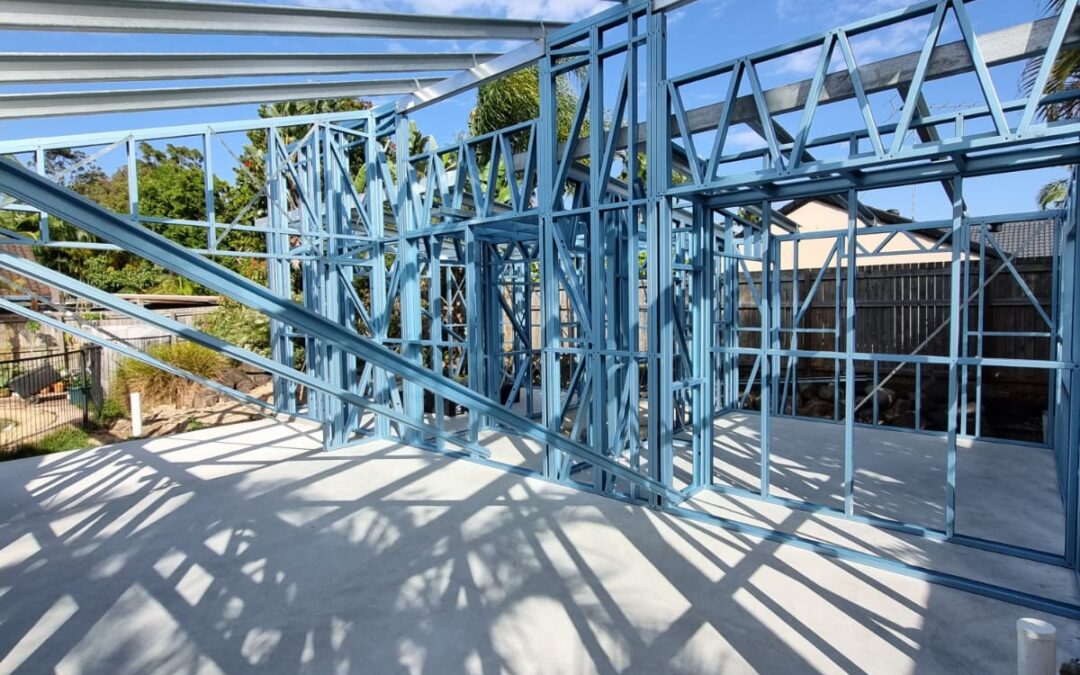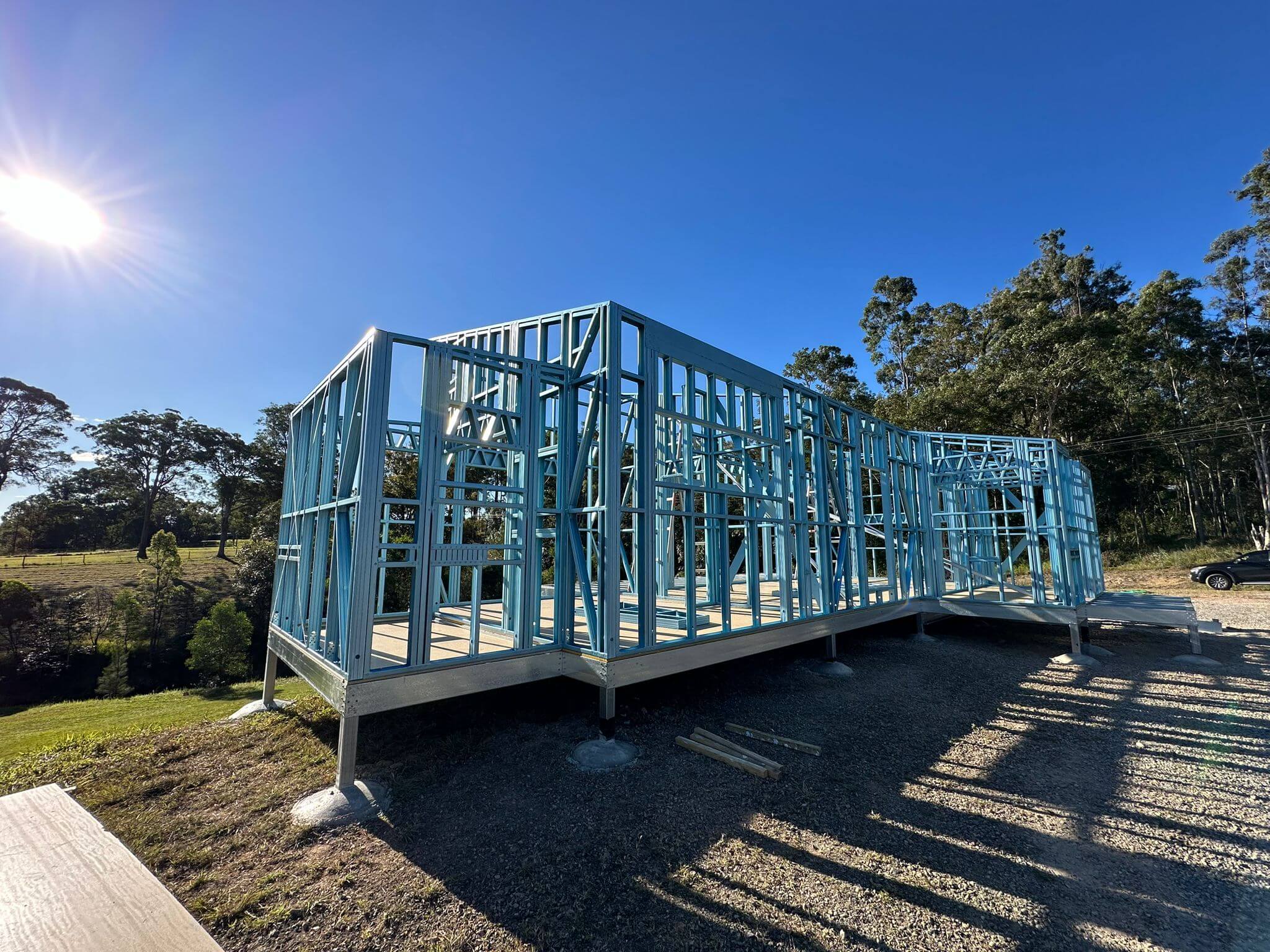When it comes to choosing the best foundation for your building project, two of the most common options are the steel floor system and the concrete slab. Both provide essential structural support, but they have distinct advantages and considerations depending on your project’s needs. In this blog, we’ll compare steel floor systems and concrete slabs to help you make an informed decision about which foundation is best suited to your construction.
1. Steel Floor System: The Modern Solution
A steel floor system uses prefabricated steel frames, often made from BlueScope TRUECORE® steel, to create a strong, lightweight foundation for your building. Steel floor systems are increasingly popular for residential, commercial, and industrial construction, thanks to their numerous benefits.
Advantages of Steel Floor Systems:
- Quick and Easy Installation: Steel floor systems are pre-engineered, reducing on-site labor and installation time. Once on-site, the frames can be assembled quickly, speeding up the construction process.
- Lightweight and Strong: Steel is known for its strength and durability, and the steel floor system maintains these properties while being lighter than concrete. This can be particularly beneficial for projects with weight restrictions or limited access for heavy equipment.
- Elevated Structure: Steel floor systems raise your building off the ground, which can be advantageous in areas prone to flooding or moisture. The space beneath the structure can also be used for ventilation or as a crawl space.
- Resistant to Pests and Moisture: Unlike timber floor systems, steel is impervious to termites, rot, and other moisture-related issues, providing a long-lasting, low-maintenance solution.
- Sustainability: Steel is 100% recyclable, making it a more eco-friendly option for construction compared to concrete.
Ideal For:
- Sloped land: Steel floor systems are highly effective on uneven or sloped ground.
- Flood-prone areas: The elevated structure of steel floors makes them a good choice in flood zones.
- Residential homes and small commercial buildings that require a fast and flexible foundation solution.
2. Concrete Slab: The Traditional Foundation
A concrete slab is a solid, poured foundation that forms the base of your building. This system is commonly used in both residential and commercial construction, providing a robust and permanent solution. Concrete slabs are either slab-on-ground, raised, or suspended, depending on the structure and the specific needs of the site.
Advantages of Concrete Slabs:
- Solid and Permanent: Concrete slabs create a strong and permanent foundation that directly supports the weight of the building. Once poured and set, the concrete provides excellent structural integrity.
- Energy Efficiency: Concrete has natural thermal mass, meaning it can absorb and store heat, which helps regulate the temperature inside your building. This can lead to energy savings, especially in areas with extreme temperatures.
- Durable and Low Maintenance: Concrete is highly durable and requires little maintenance. It’s resistant to most environmental factors, including high winds, earthquakes, and even fire.
- Suitable for Various Soil Types: Concrete slabs are ideal for flat or level sites and can be adapted to suit different soil conditions by using appropriate reinforcement.
Ideal For:
- Flat sites: Concrete slabs are ideal for level ground and can be poured directly onto the soil.
- Heavy-duty buildings: Concrete is excellent for supporting heavier structures, including large commercial buildings, warehouses, or industrial facilities.
- Energy-efficient homes: Concrete slabs are well-suited for energy-efficient designs due to their thermal mass properties.
Steel Floor System vs Concrete Slab: Key Considerations
When deciding between a steel floor system and a concrete slab, consider the following factors:
- Project Type:
- If you’re building a residential home or light commercial building, a steel floor system offers quick installation, flexibility, and pest resistance.
- For heavy-duty structures like factories, warehouses, or large commercial buildings, a concrete slab may provide the added strength and permanence required.
- Land and Site Conditions:
- Steel floor systems are ideal for sloped land, moisture-prone areas, and places where you need to keep the structure elevated above the ground. They’re also easier to install in tight spaces or on uneven ground.
- If your site is flat and stable, a concrete slab may be a more straightforward option.
- Time and Cost:
- Steel floor systems can reduce construction time with faster installation, which may lower overall project costs. The prefabricated nature of the frames minimises on-site labour.
- Concrete slabs require more time for curing, particularly with larger or thicker slabs, which could extend your project timeline.
- Maintenance and Longevity:
- Steel floor systems are low maintenance and highly resistant to pests and moisture, but they may require periodic inspections to ensure the steel frames remain in good condition.
- Concrete slabs are durable and can require less ongoing maintenance but may need repairs in the event of cracking or settling.
Conclusion: Which Is Right for Your Project?
Both steel floor systems and concrete slabs have their place in modern construction, each offering distinct advantages. If your project demands speed, flexibility, and pest resistance, a steel floor system might be the ideal choice. However, if you need a strong, solid, and permanent foundation for a larger or more complex building, a concrete slab could be the best option.
At Frame iQ, we specialize in providing steel framing solutions that are quick to install, durable, and eco-friendly. Whether you’re looking for a steel floor system & frame or a steel frame to suit your slab, our team is here to help you make the best decision for your needs.


